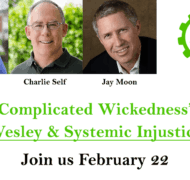Webinar: How Wesley Understood and Fought Systemic Injustice
News and Events / Produced by partner of TOW
Sponsored by Karam Fellowship, featuring Theology of Work Project staff member Jennifer Woodruff Tait
Recorded February 22 at 11:00-11:45am central time (noon eastern/9:00 Pacific).
John Wesley built his movement in the midst of one of the most massive economic and social changes in history – the Industrial Revolution. Wesley’s ability to affirm what was good and challenge what was bad in this dynamic upheaval was critical to the vitality and influence of his ministry.
But what does it mean to say that he “challenged what was bad” in the changes going on in his time? One key aspect of it was Wesley’s ability to hold together two things that the church today struggles to integrate – the calling to a personal struggle against sin in our hearts and individual behavior, and the recognition that sin also becomes institutionalized in social systems that need to be challenged and reformed.
Wesley spoke of “complicated wickedness,” and the need to address both the social and individual manifestations of sin and injustice. This came up in our brand-new Economic Wisdom Project Talk on Wesley and the Industrial Revolution:
Jennifer Woodruff Tait: I also think that Wesley gives us some good templates to look at structural inequality…in the way he treated the liquor traffic. He didn’t always see the structural issues behind every dislocating thing, but he was really keyed into that on alcoholism and the liquor traffic. And going back and reading his works on that, you know, he was quite clear: This was a problem that was not going to be solved by individual drunkards, alone, getting right with Jesus. It was a problem that was going to be solved by an entire industry taking a good look at itself. And I think there are lessons in that for lots of industries today.
Jay Moon: So Wesley used a term like “complicated wickedness.”
Woodruff Tait: Yes. There’s a lot of complicated wickedness out there!
This webinar that will provide a deep dive on this concept – how Wesley handled, theologically and practically, the dynamic interdependence of the systemic/institutionalized aspects of evil and personal moral responsibility. Jennifer Woodruff Tait, Charlie Self and Jay Moon, fresh from their conversation on Wesley and the Industrial Revolution at Karam Forum 2021, will reconvene to give us a deep dive into this aspect of Wesley’s work.
We’re looking forward to a stimulating discussion with two historians and a missiologist, all of whom have done a lot of work both on Wesley’s history and on the church’s contemporary challenges:
Jennifer Woodruff Tait is editor of Christian History magazine, webmaster for the Theology of Work Project, and priest of St. John’s Episcopal Church in Corbin, Ky. She is a former Methodist pastor and a historian who has written a good deal on Wesley’s social witness – including here in our ON newsletter.
Charlie Self teaches history at Assemblies of God Theological Seminary and Northpoint Bible College, and is a longtime contributor and advisor to Made to Flourish. He is co-creator of Discipleship Dynamics, and writes and speaks extensively on both history and the contemporary mission of the church. He is also a board member of Karam Fellowship and a longtime leader in the ON.
Jay Moon is a professor of evangelism and church planting at Asbury Theological Seminary, where he also directs the Office of Faith, Work and Economics. After 13 years as a missionary in Ghana, Moon entered theological education, and became an early leader in the ON. He has written books on social entrepreneurship and the gospel in a diverse world. He is also a board member of Karam Fellowship.




